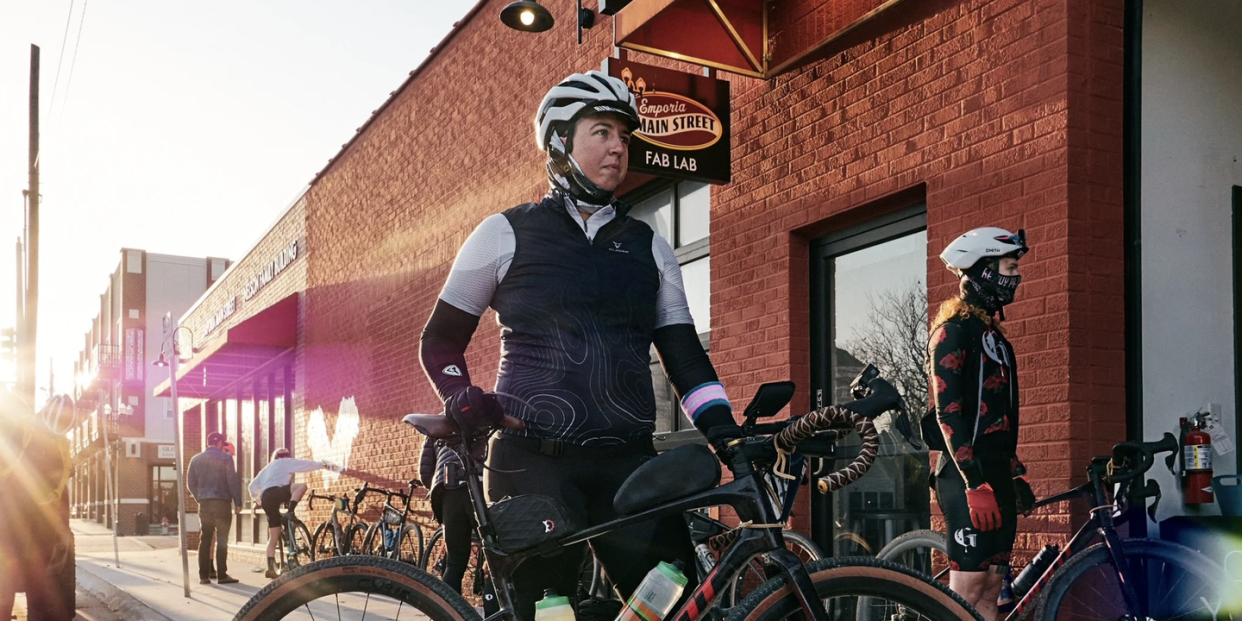Abi Robins on Why Non-Binary Representation in Bike Races Matters

Abi Robins founded Queer Gravel with a very clear mission: to help queer- and trans-identifying riders have a community and be able to ride gravel safely. “In the U.S. and abroad, the majority of gravel cycling takes place in spaces that historically (and currently) have been hostile towards queer and trans people, especially trans people of color. Queer Gravel is a group of queer and trans folks, as well as steadfast accomplices, who are committed to making off-road cycling safe, welcoming, and inclusive for all people,” the Queer Gravel mission statement reads.
Robins was the first person to race the infamous gravel event Unbound in the non-binary category back in 2021. They were the only competitor in the category. The next year, 17 athletes competed in the various Unbound race lengths in the Non-Binary category. This year, 15 non-binary athletes finished Unbound, including one Unbound XL 350-mile finisher.
In a recent interview, Robins explained that a major impetus for the inclusion of the category was the shocking amount of anti-trans legislation that was being introduced across the U.S, often in states like Arkansas where some of the major gravel (and other cycling) events were being held.
That same year, trans advocate Molly Cameron also made headlines as she shared concerns about cyclocross World Championships being held in Arkansas, arguing that the safety of the trans and queer people in the cycling community was at risk.
Life Time events (the owner of Unbound) put out a statement clarifying their stance on trans inclusions. Life Time has inclusive categories for trans women to race in the women’s category as long as they meet certain criteria. However, at the time, there was no direction for women who didn’t meet that inclusion criteria, or for those who identify as non-binary.
“I showed up in 2021 and I was the first non-binary champion of Unbound, but I was also the only one there,” Robins said in the interview. “And Unbound and Life Time really took the opportunity to platform me and kind of make a fuss about what space they had created in hopes of getting more people to the event. It’s been cool to watch because it’s really one of those situations where if you build it, we will come.”
So, how can events create a safe, inclusive space for all riders? First, create that non-binary category, says Robins. “I want to show up at events where I feel safe and welcomed and like I can show up as my full self,” they said. “So if an event has that, then that’s the first check for me.”
They also look for things like non-gendered bathroom options (which should be easy with port-a-potties!) and whether the race has a plan for medical care that’s taken trans athletes into consideration (since in some areas, getting medical help for a trans person isn’t a guarantee).
However, Robins doesn’t believe that event inclusion is necessarily the most important touchpoint for trans and queer cyclists. To even get to the start line—or be pondering the idea of racing—a person needs to feel welcome in their local cycling community, whether that means simply feeling comfortable in the local bike shop or going to a group ride with the local cycling club.
“There are definitely cool bike shops in cool cities, but I’d love for it to be a much more ubiquitous thing where a trans or non-binary person can walk into a bike shop and feel safe,” Robins said.
“I’ve experienced firsthand the power of spending time on a bike with someone you don’t know and how equalizing and connective it can be,” Robins added. “I try not to overstate it, but I do really feel like Gravel is one of the places where we have the ability to make a powerful and positive social impact that’s not just about cycling, but is about the country and the world.
You Might Also Like

